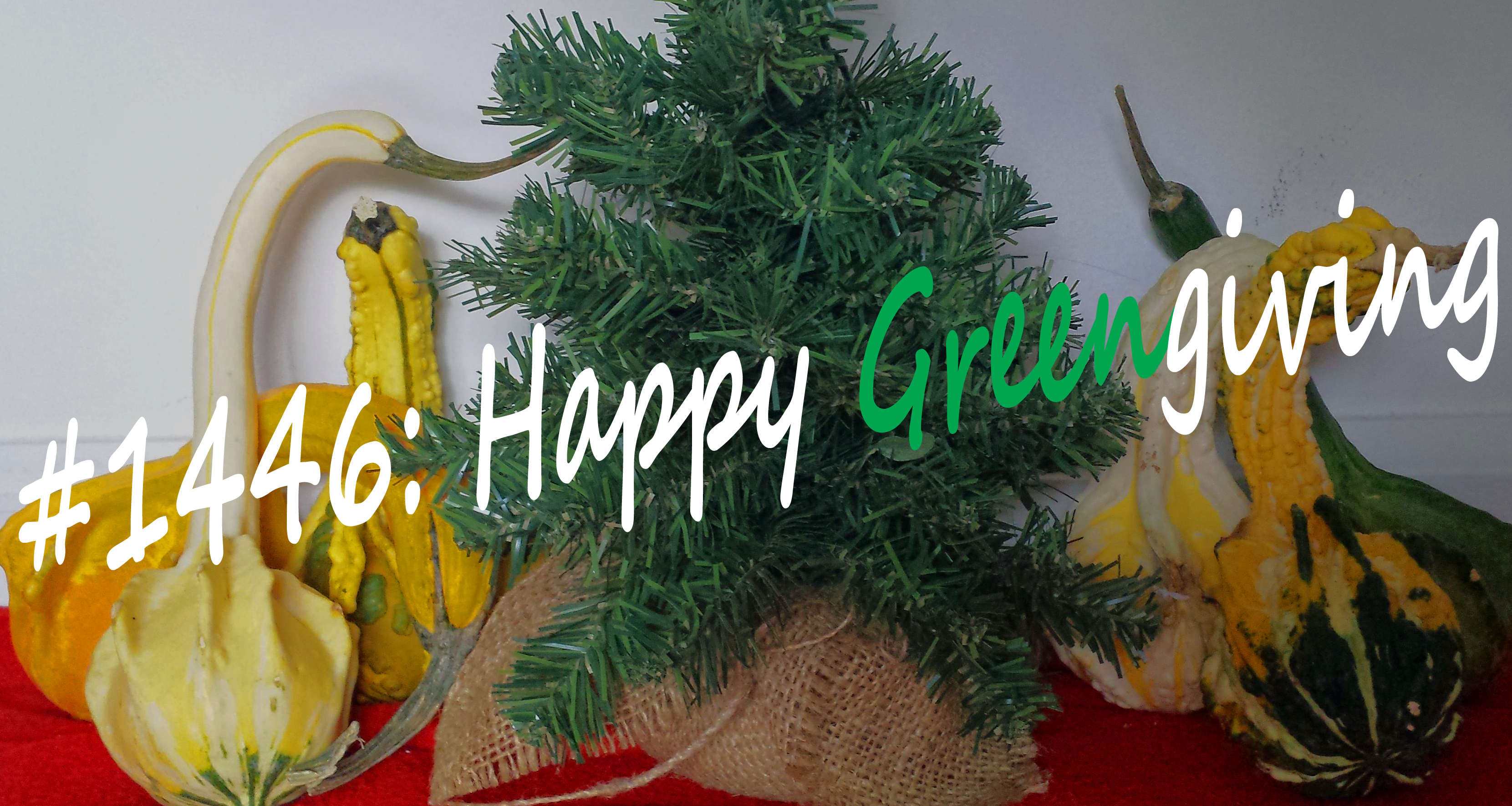We are a world filled with plastic bottles, bags, straws, packaging and more. Rivers, lakes, oceans, parks, highways, train tracks, fields are littered with single use throwaway plastic and it is damaging the planet. We can use our collective will to be more proactive and work to find solutions, as well as take personal responsibility. On this episode Green Divas Meg and Max delve into the plastic problem and give information and ideas about the problem and what can be done about it. We talk to Eileen Bastianelli, Founder of Eco Centric Solutions, who is a Plastic Hunter (she helps promote One Plastic Free Day) as well as a marketing advisor and eco-steward of the earth, about steps that can be taken to reduce plastic. For more information go to oneplasticfreeday.com. We also talk about the Octopuses Garden in the shade filled with plastic straws. We would love to hear from you, so tweet us @tmshadesofgreen, @50ShadesofGDs, @thegreendivas. Find us on Facebook, Instagram and tune in via thegreendivas.com on Spotify, Buzzsprout, iHeart, iTunes and ask Alexa or Siri to play The Green Divas podcast. #RaiseYourEcoConsciousness
Category: Sustainably Made Products
1810 The Greening of the Entertainment industry with Earth Angel, Film Biz Recycling, ArtCube Nation and Rock and Wrap It Up
Yes, the film and TV industries are wasteful, but… with the help of some wonderful people and organizations, the landfills are less full of discarded sets and food, and therefore, as the slogan created by our guest Eva Radke so aptly puts it, “Not in a Dumpster.” We talk to Emellie O’Brien, founder of Earth Angel, Samita Wolfe, Director of Film Biz Recycling in Savannah, Eva Radke, founder and CEO of ArtCube Nation, and Syd Mandelbaum, founder of Rock and Wrap it Up, about their roles in keeping the entertainment industry cleaner and less wasteful. We also touch on the topic of asteroids, green screens and raccoons. Find out what the Amazing Spiderman-2, VINYL, Elementary, The Marvelous Mrs. Maisel and 30 Rock have in common… hint green and sustainable TV and film sets.
For more info check out: Earthangel.nyc, Filmbizrecycling.org, ArtCubeNation.com, RockandWrapItUp.org and TheGreenDivas.com
1717 #StopSucking, Strawless Oceans, and Strawsome
Green Diva Meg and I speak with Dune Ives, Co-founder of the Lonely Whale Foundation, which has a campaign to reduce how plastic straws find their way into the ocean. Check out their Strawless Ocean (#StopSucking) campaign.
Plastics wind up in are the ocean via land and are carried by the wind and rain into the sea. Grocery bags, coffee cup lids, plastic bottles, straws and more. We need to work to stop this from happening.
One solution is in the form of glass straws, and we speak to Daedra Surowiec, Founder of Strawsome, which produces beautiful glass straws as an alternative to the polluting plastic version. They even designed a straw for the 50 Shades of Green Divas, called the GD Straw. Details coming soon on how you can purchase them.
Will we be able to get the now crippled EPA to regulate plastics as a pollutant under the Clean Water? Find out by going to:biologicaldiversity.org/campaigns/oceans and getting more info.
For additional info go to: lonelywhale.org, strawsome.com, thegreendivas.com and themanyshadesofgreen.com
1713 Project Farmhouse, GrowNYC with guest Amanda Gentile
Our guest this week on 50 Shades of Green Divas is Amanda Gentile of GrowNYC. We discuss Project Farmhouse, a beautiful new LEED certified facility, which brings farming and sustainable education into the heart of NYC. The space contains a full kitchen, conference area, and it has a Green Hydroponic wall which contains freshly grown herbs and greens. Amanda explains the importance of this new facility, and the need to educate citizens of NYC and beyond, about healthy eating, being more sustainable and practicing the three Rs (reduce, reuse and recycle) within one’s daily routine. Changing our habits just a little bit will make Mother Nature and all Earth’s creatures breathe easier.
For more information go to: projectfarmhouse.org, grownyc.org and thegreendivas.com. Tweet us your thoughts @tmshadesofgreen
1706 Sugar Detox Me with Summer Rayne Oakes
Plants, Bugs, Sugar Detox Me
On this episode of 50 Shades of Green Divas, Meg and I chat with guest Summer Rayne Oakes about how houseplants and beneficial bugs create a healthy environment in your home. Unless the plant is Seymour from The Little Shop of Horrors, plants are very important as natural air filters, as well as adding color and vibrancy to your house decor. We also talk about her new book Sugar Detox Me, and why it is important to reduce sugar in your diet. So think twice before you swig down that cola or eat that piece of pie. For more information go to homesteadbrooklyn.com and sugardetox.me
How the Purchase of Cotton Pants and Panties Can Change the World
By Susan Lutz
When shopping, the world sits on my shoulder. I feel it. Products scream at me: buy me! I’m a deal! Good for your pocketbook! Just what you want – what your kids need – stylish! I slide shirts down the rack, wondering who made it, what chemicals were used in the fields, and if the product is GMO. Food tops the list when we think of buying organic and fair trade. However, cotton must be added to our list and be a part of our consciousness as it’s an important crop to choose organic and fair trade.
The Organic Consumer’s Association highlighted aspects of a report by The Institute of Science in Society. It called cotton a “triple-threat…because it produces fiber, food, and feed….Monsanto Corporation has been a major source of genetically modified (GM) cotton lines.”
Cotton ranks as one of the highest producer of GMOs, falling in line with soy, canola, and corn. The Environmental Justice Foundation put out a report siting the commodity of cotton and the dangers it poses to workers, which include children, in the fields.
Pants, shoes, shirts, yoga clothes, and even panties, can be produced with organic cotton and fair trade certification. So much bedding, pillows, shoes, and of course clothes contain cotton. The cotton crop is estimated at $32 billion yearly.
With children, and especially with teenagers, grabbing the latest styles is tempting so many brands sell at cheaper prices due to the above-named factors. By dusting the crops with chemicals and using non-fair trade labor tactics, the price point goes down. I look to several practical solutions to introduce the use of organic cotton into our lives. I won’t be able to buy everything fair trade or organic. So, I work on choosing one area I can commit to and get as much out of my dollar while also supporting environmentally friendly products.
- Going to the thrift store can stretch an item’s use – no one had to work in the fields a second time to put it up for sale. The second use recycles and produces less of an environmental impact all-around.
- Decide on choosing a few items that will last – a great t-shirt made from organic cotton or a pair of organic cotton fair trade jeans – probably love them more, appreciate them more, and enjoy them more, too!
- Pick one item and buy only fair trade and/or organic within that department. Green panties are a good start. Just like food, I can’t swing buying all organic; however, I commit to a few items and stick with it.
Never underestimate the power of our voice through out purchases
When Communities Come Together, Certain Things Happen
By Susan Lutz
Hope seems lost. So often headlines tumble us backwards, forgetting that hope exists. But all is not lost. I found hope, and more, in these stories, these people, and these communities – each bringing rejuvenation to our environment and its communities. Moreover, it’s not just hope that these stories project. Within the actions and hearts of the people in these stories, a deep certainty resides in their power to change not only life for themselves but for others.
- Taking Back Detroit Neighborhoods with the Power of Organic and Community – Urban depression runs through many areas of large cities. Abandoned homes often represent a dark picture of an impossible task: how to bring life back to once vital areas. This Detroit neighborhood is taking back its homes and its community by using YouTube, gardening, and the support of each other to revitalize and reclaim a neighborhood.
- Planting Trees as a Mission – This 103-year-old woman Karnataka has planted not just one, two, or even 100 trees. Saalumarada Thimmakka, from India, has for the last 50 years planted over 400 banyan trees. But that’s not all. She also fights to get a hospital in her community.
- Urban Garden in the Heart of NYC – In a place least expected, the Urban Garden Center sprouted, providing fresh natural food and serving the community through gatherings and education. The Urban Garden Center has forged on, despite many obstacles. Their location houses a two-block stretch of city concrete under part of the railway system. What they do inspires others to bring the beauty and revitalization of greens into city living.
- Empowerment through Fair Trade – The success of companies will no longer be measured in dollars only. Perhaps that never was true success. Some companies achieve empowerment for their community and themselves by giving back. Alaffia is a company in Togo, Africa with a mission to invest in the community. They state that their goal is to end poverty and foster gender equality. They work on things such as educational projects, maternal health, and reforestation, to name a few.
Connecting with the community, demonstrating an organic lifestyle, and helping others through cooperation with the environment, brings forth prosperity, perhaps slowly, but surely. As the large corporations struggle with profits, they now look to the little – though giants in heart – as models for the future. The power of their certainty plants seeds of true change that will benefit all.
DARK Act Passes Congress: Act Now to Defeat It
By Susan Lutz
The Right-Not-To-Know gained ground in congress in another attempt to keep information hidden and corporate operations thriving. If you want to know what’s in your food, take the time now to contact your Senator to repeal the DARK Act.
A few weeks ago, I wrote about the upcoming vote in the House:
The bill, dubbed The Dark Act: Deny Americans the Right to Know, #stopDARKact, is spun by supporters to look as though it is legislation supporting transparency, but according to a recent House Agriculture Committee on Biotech Labeling Laws with Just Label It chairman, Gary Hishberg, it’s an anti-labeling push to keep the consumer out of the labeling process. A proposed amendment, mandating GMO labeling is being backed by anti GMO groups.
Humor helps break down topics. Laughter relieves tension and lets the commentary get to the truth. To better understand the issues, here is a clip from Bill Maher who “labeled” the issue perfectly and asked if we wanted a legislation that was “the freedom from information act?”
The Organic Consumers Association is encouraging citizens to truly understand what is happening:
Now that the DARK Act has been approved by the House, we’ll have to stop it in the Senate. We have to move fast—because Monsanto is desperate to pass a bill that preempts mandatory GMO labeling laws at the state and federal levels, before Vermont’s GMO labeling law takes effect next year.
This legislation hides the ultimate goal of furthering interests of a larger, corporate interest. When meat is in clear, pretty cellophane packages and the only thing you see on the label is the price, it’ll be too late to ask: Where did the beef come from? And what’s in it?
Take action now. Contact your Senators. Share. Let others know.
#LabelGMOs #GMO #Food #Ag #RightToKnow
Kill the K-Cup Before It Kills Us
By Susan Lutz
In the hospital, I waited for my son to get out of a simple procedure; we’d be home by the end of the day. I looked at the counter, hoping for some coffee. And, there it was. Packaged. Flavor injected. Plastic. The K-cup – the new, killer coffee that’s killing the coffee with its convenient, single-serving delivery system. Coffee drinkers loaded up and bought them, about 9 billion a year, filling a need we didn’t even know we had.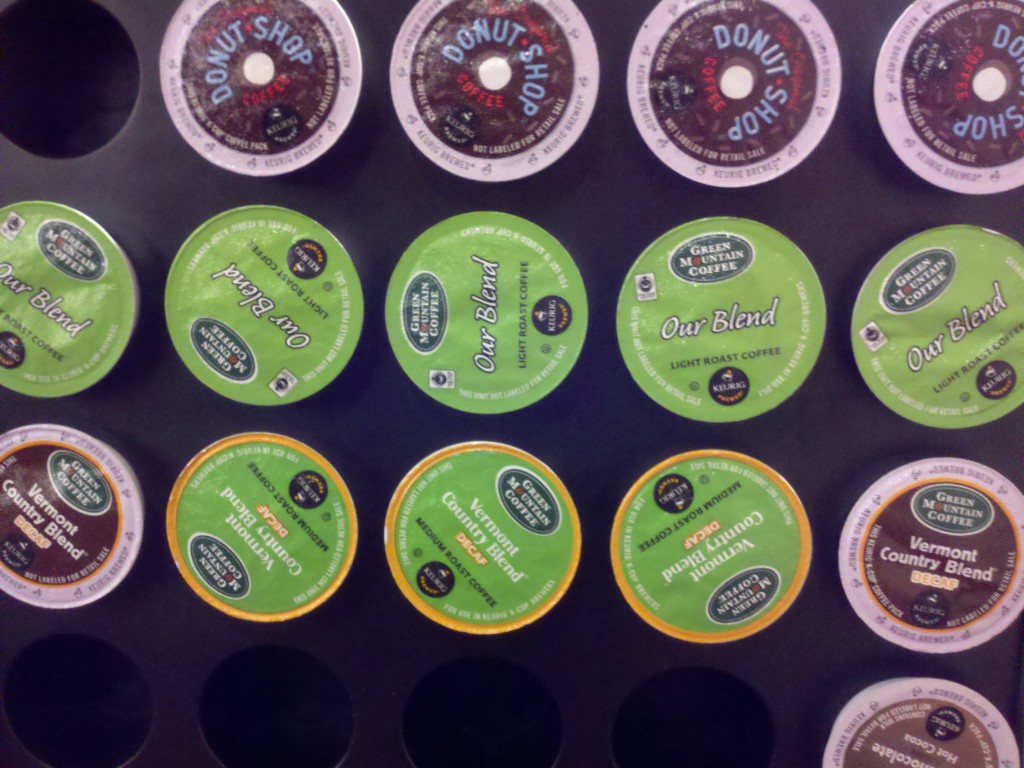
Billions of cups mean billions of little plastic, worthless-after-one use, go-in-the-trash cups. And the cost doesn’t seem to matter. Folgers coffee, in one of those K-cups, measures out to $50.00 a serving. For a few years, I owned a coffee shop; I wasn’t making that kind of margin. Even the priciest of coffees from the most exotic of places doesn’t garner that price.
The profit is not going to the farmers either. Is the coffee organic? Fair trade? Mostly no, though suppliers are putting out organic and fair trade. Our desire for this product is insatiable. I spent time with the people working the coffee fields. It’s a tough life. Many do not have medical coverage, are exposed to chemicals and treated poorly. Many are women and children. We love our coffee. We treat it almost as if it is a right rather than a privilege. Before the hospital waiting room, I had never seen these machines in action. I thought they were a 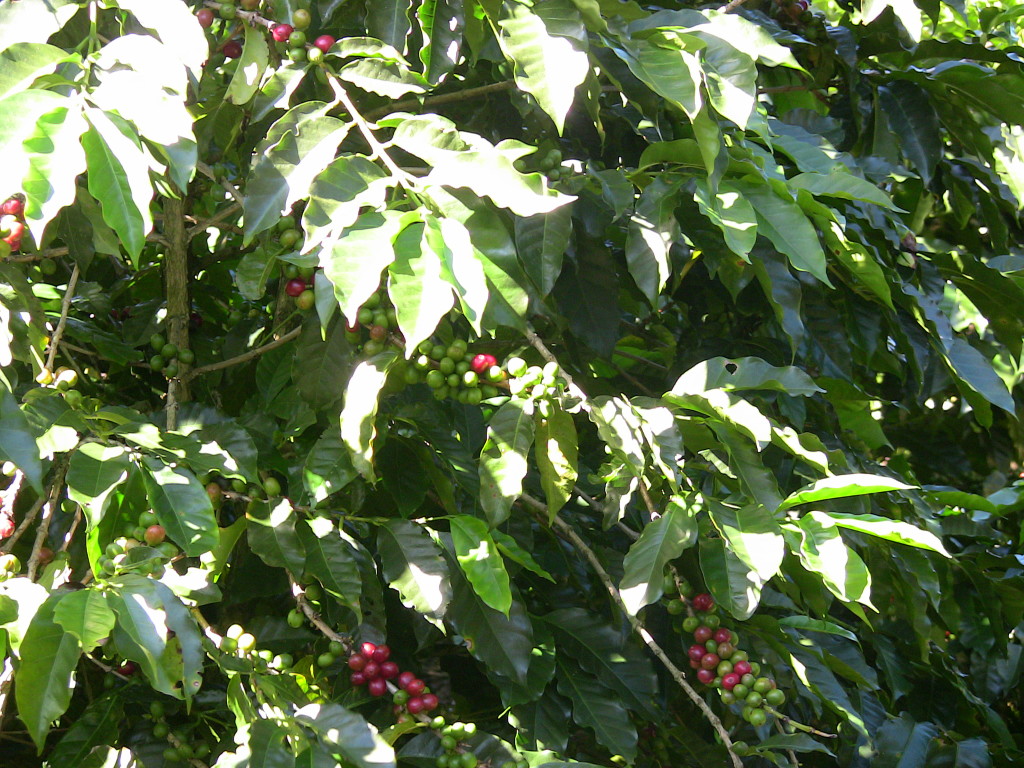 luxury. But, I lived in Central America where most things are luxuries, including roofs that don’t leak and enough food to feed a family.
luxury. But, I lived in Central America where most things are luxuries, including roofs that don’t leak and enough food to feed a family.
An hour went by as I waited for my son. I was hungry and the coffee looked so tempting. I put the K-cup into the spot, pushed a button and got just water. I walked down the hall to the bathroom and dumped out the water. I tried again and got the worst coffee I’d ever tasted. I went to the bathroom and dumped it out. When I threw away the little cup, I felt miserable. I had no coffee, I was in a hospital, and now I just added to the billions of little, non-recyclable trash mounding in landfills.
There’s a campaign to KILLTHEKCUP with a pretty intense video about the destruction of our planet from the killer K-cup. I saw an interview with Kevin Sullivan, chief technology officer at Keurig Green Mountain, maker of coffee machines on CBS Sunday Morning. He said the company was beginning to find ways to make the product recycle by 2020:
“We’ve been hard at work to solve that problem,” said Sullivan. “We introduced a system called Vue that has cups that are, in fact, recyclable. We have a company objective that everything will be recyclable by the year 2020. We certainly aren’t going to wait that long. I think we’re going to start that much sooner, and hopefully convert sooner than that.”
I was stunned. By 2020 the company will have little plastic k-cups that are recyclable? Do the math. Let’s say, for simplicity, 9 billion cups are sold a year, starting in 2015 and going until 2019 (we’ll just ignore the damage already done and we’ll ignore growth or decline in sales):
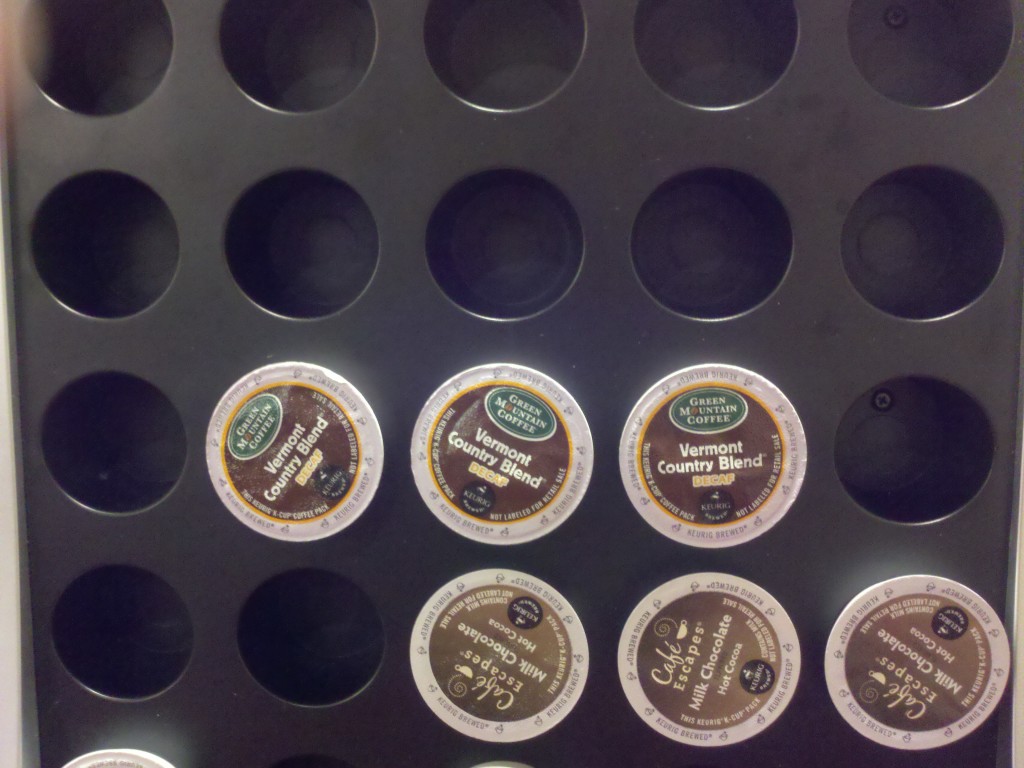 9 billion x 5 = 45 billion little, useless plastic cups filling up our needs to get something quick, fast, and with no regard for others. Getting the k-cup recyclable is, in this day and age, a non-negotiable item. But why after the fact? Why not create the product with some consciousness before the damage is done? Did Kevin Sullivan ever hear of climate change? We cause climate change in every choice we make. It’s not just the billowing smoke from factory smoke stacks. It’s us, our decisions to use or reuse or to choose sustainable with our spending power. There’s plenty of other single serving machines out there that cost the same or less than the Keurig coffee system. Are we that tight for time we can’t spend another minute tamping down a bit of coffee in a reusable machine?
9 billion x 5 = 45 billion little, useless plastic cups filling up our needs to get something quick, fast, and with no regard for others. Getting the k-cup recyclable is, in this day and age, a non-negotiable item. But why after the fact? Why not create the product with some consciousness before the damage is done? Did Kevin Sullivan ever hear of climate change? We cause climate change in every choice we make. It’s not just the billowing smoke from factory smoke stacks. It’s us, our decisions to use or reuse or to choose sustainable with our spending power. There’s plenty of other single serving machines out there that cost the same or less than the Keurig coffee system. Are we that tight for time we can’t spend another minute tamping down a bit of coffee in a reusable machine?
My son and I went home. He was sleepy, but up and playing like little kids do by early evening. I made a cup of coffee when I got home, a single, grounds-only, cup of coffee. It was worth the wait.
#1502: Not in a Dumpster
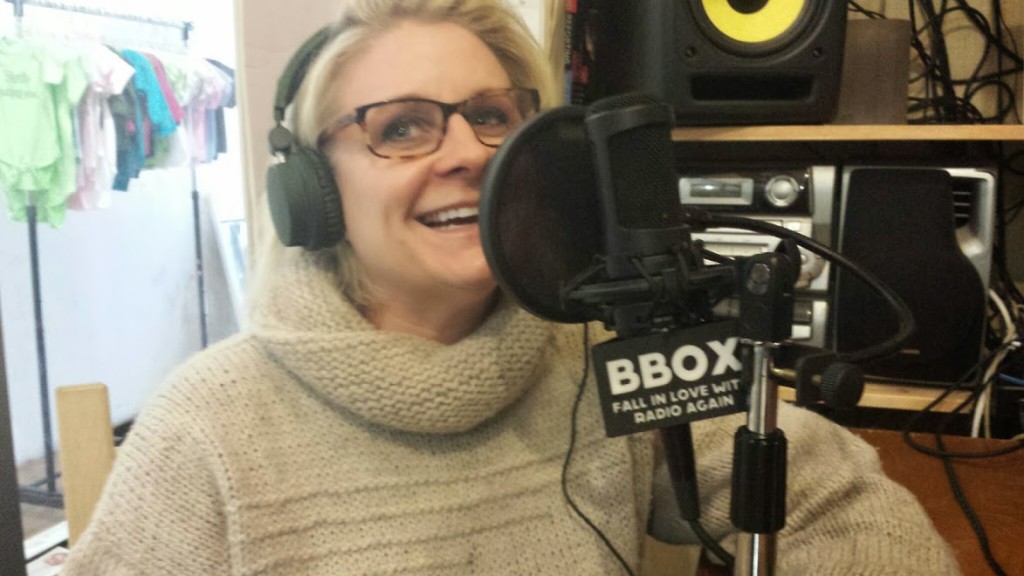 We welcome back friend of the show, and a super green human, Eva Radke, founder of Film Biz Recycling, an organization that diverts set materials from film, television and theatre, and recycles, reuses, redistributes and re-purposes those items. “Not in a Dumpster” is the mantra of Film Biz Recycling, and there are exciting new projects which are on the horizon for the coming year. The prop shop is a great place to find clothes, furniture and collectibles that have been used to dress sets such as 30 Rock, Gossip Girls, The Amazing Spiderman 2 and many more. To find out all the great things Film Biz Recycling is doing, and to get information about the prop shop, go to filmbizrecycling.org
We welcome back friend of the show, and a super green human, Eva Radke, founder of Film Biz Recycling, an organization that diverts set materials from film, television and theatre, and recycles, reuses, redistributes and re-purposes those items. “Not in a Dumpster” is the mantra of Film Biz Recycling, and there are exciting new projects which are on the horizon for the coming year. The prop shop is a great place to find clothes, furniture and collectibles that have been used to dress sets such as 30 Rock, Gossip Girls, The Amazing Spiderman 2 and many more. To find out all the great things Film Biz Recycling is doing, and to get information about the prop shop, go to filmbizrecycling.org
The Green Stream: Beware of US Food Politics
The need is greater than ever to be involved in the growing sustainability and food movement. The threats that our agriculture industry pose on climate change and human survival are blatantly obvious at this point, yet it seems that many US politicians have forsaken their duty as representatives of the common good of America while instead succumbing to the pressures of politics and corporate interest. For the sake of being concise, I won’t get into the details of the destruction that Monsanto Company and similar operations are causing to humanity and to nature. For a summary of these details, click here.
Today, I am focusing more on the dilemma of Michael R. Taylor slithering his way from atop multiple powerful positions working for Monsanto Company to holding America’s health in the palm of his hand as head honcho of the FDA. And last but not least, I hope to begin to show you all how gravely this affects us all.
To start off I want to ask a question. When did it become acceptable in this country to let someone switch so freely between the position of corporate lobbyist/lawyer and policy maker in the same field? That is what FDA Deputy Commissioner for Food and Veterinary Medicine Michael R.Taylor did. Also, do me a quick favor and google the relationship he has had with King & Spalding, a law firm that has a history of representing Monsanto. This, my friends has been called by Marion Nestle, who wrote Food Politics, “a classic example of the revolving door.”
There are those who argue for Taylor’s innocence however. Bill Marler who wrote Mike Taylor and the Myth of the Monsanto Man, claims that after knowing of him (not directly knowing him) for nearly 20 years, he is convinced Taylor is non-partial to Monsanto. Taylor himself is quoted in the article saying, “The government has clear rules about what a person can and cannot work on under those circumstances (potential partiality to an industry),” Marler then establishes his line that Taylor “follows those rules very carefully.” Marler continues to explain that when Taylor held the Deputy Commissioner for Policy (FDA) in the mid-’90s, the FDA Ethics Counsel said that he could work on general policy matters, such as policies for food labeling, but that he was precluded from any involvement in specific product approvals of interest to Monsanto. HOLD ON!
Seeing as one of the biggest US food policy issues right now is the requirement of food companies to label GMO foods, this seems like an issue that former Monsanto lawyer and VP of public policy at the largest GMO company in the world should not be engaging in! American health is at stake!
Also, according to PF Louis in his article Biotech industry at war over GMOs; millions of dollars funneled to lawmakers, “Monsanto Mike (Taylor) was able to influence the approval of rBGH (recombinant Bovine Growth Hormone), which forces cows to yield more milk while causing infections that require antibiotics. So many milk and other dairy products became contaminated with the synthetic hormone rBGH, antibiotics, and infected cow blood and puss.” If you are unaware of the futility that over antibiotic use in factory farms is causing modern medicine please check out some of these links. I encourage you to explore the topic in more detail.
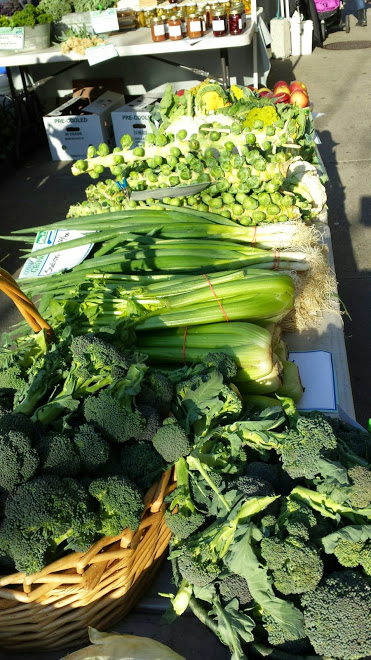 Long story short, America’s reckless agricultural techniques and lack of quality governmental oversight has created a situation in which Americans are falsely assured by their own government about the safety of their food. It is a situation that still has its solutions though. What we need is mass education which will contribute to a snowballing in consumer awareness about the importance of the local and sustainable food movement. It has started to take hold around the world but with EVERONE’S help, we will begin to change. Their have been sparks of change so far, but we need to keep the passion strong to get the fire roaring. As we eat locally and buy from small farms, food becomes much healthier, less mysterious, and more tasty. While food transportation costs and emissions are reduced, air becomes cleaner in cities and communities become stronger through community farms and other CSA projects. If you take away one thing from this blog, let it be to buy food that comes from within 100 miles of where you live!
Long story short, America’s reckless agricultural techniques and lack of quality governmental oversight has created a situation in which Americans are falsely assured by their own government about the safety of their food. It is a situation that still has its solutions though. What we need is mass education which will contribute to a snowballing in consumer awareness about the importance of the local and sustainable food movement. It has started to take hold around the world but with EVERONE’S help, we will begin to change. Their have been sparks of change so far, but we need to keep the passion strong to get the fire roaring. As we eat locally and buy from small farms, food becomes much healthier, less mysterious, and more tasty. While food transportation costs and emissions are reduced, air becomes cleaner in cities and communities become stronger through community farms and other CSA projects. If you take away one thing from this blog, let it be to buy food that comes from within 100 miles of where you live!
I want to end this Green Stream blog with a note of optimism, because although there are many problems with our current food regulatory system and agricultural sector, there is much we all can do.
Buy local and Stay Green!
Find out more info about eating clean and stayed tuned for The Many Shades of Green’s interview with Ashley Spivak from Clean Plates!
#1446: Happy Greengiving
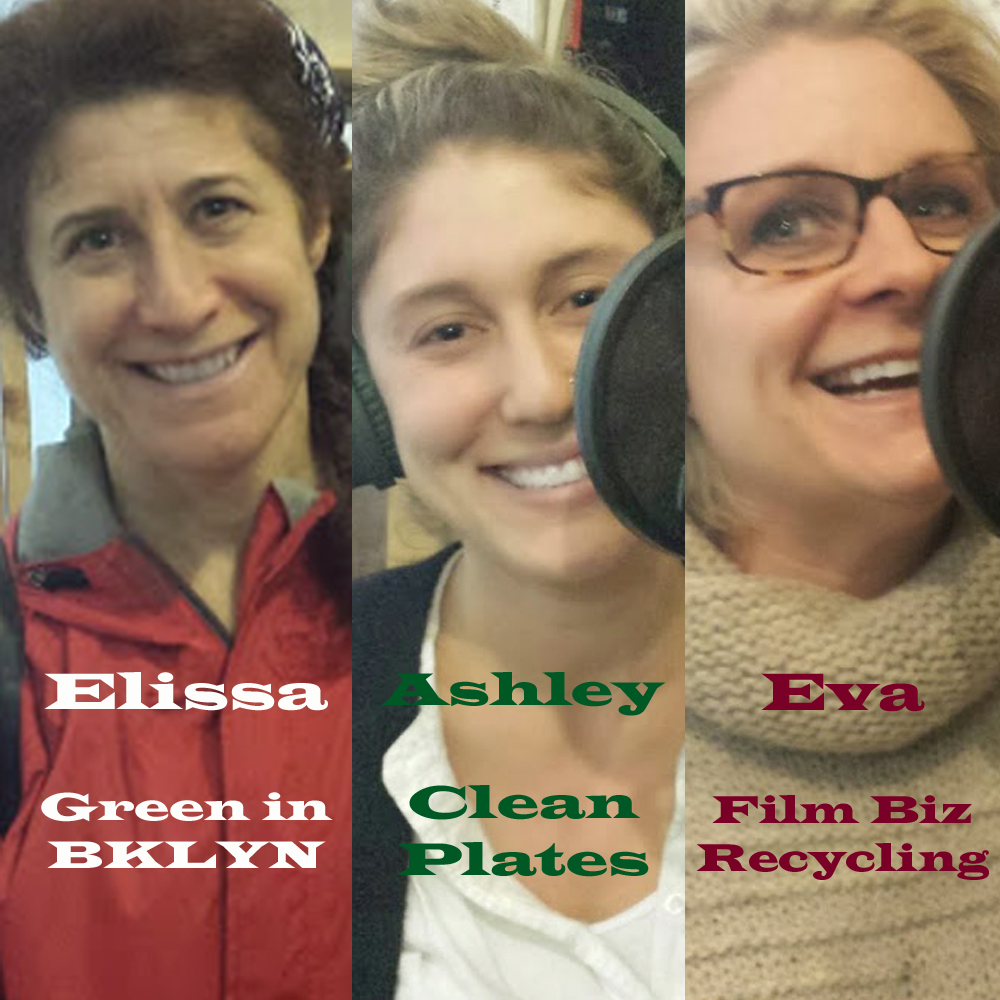
It’s that time of year again, when consumerism and family collide into what we call the holiday season. To help you incorporate sustainable choices into your gift giving, decorations and food, we’ve invited Elissa Olin from Green in BKLYN, Ashley Spivak from Clean Plates and Eva Radke of Film Biz Recycling to share their tips and ideas. greeninbklyn.com, cleanplates.com & filmbizrecycling.org

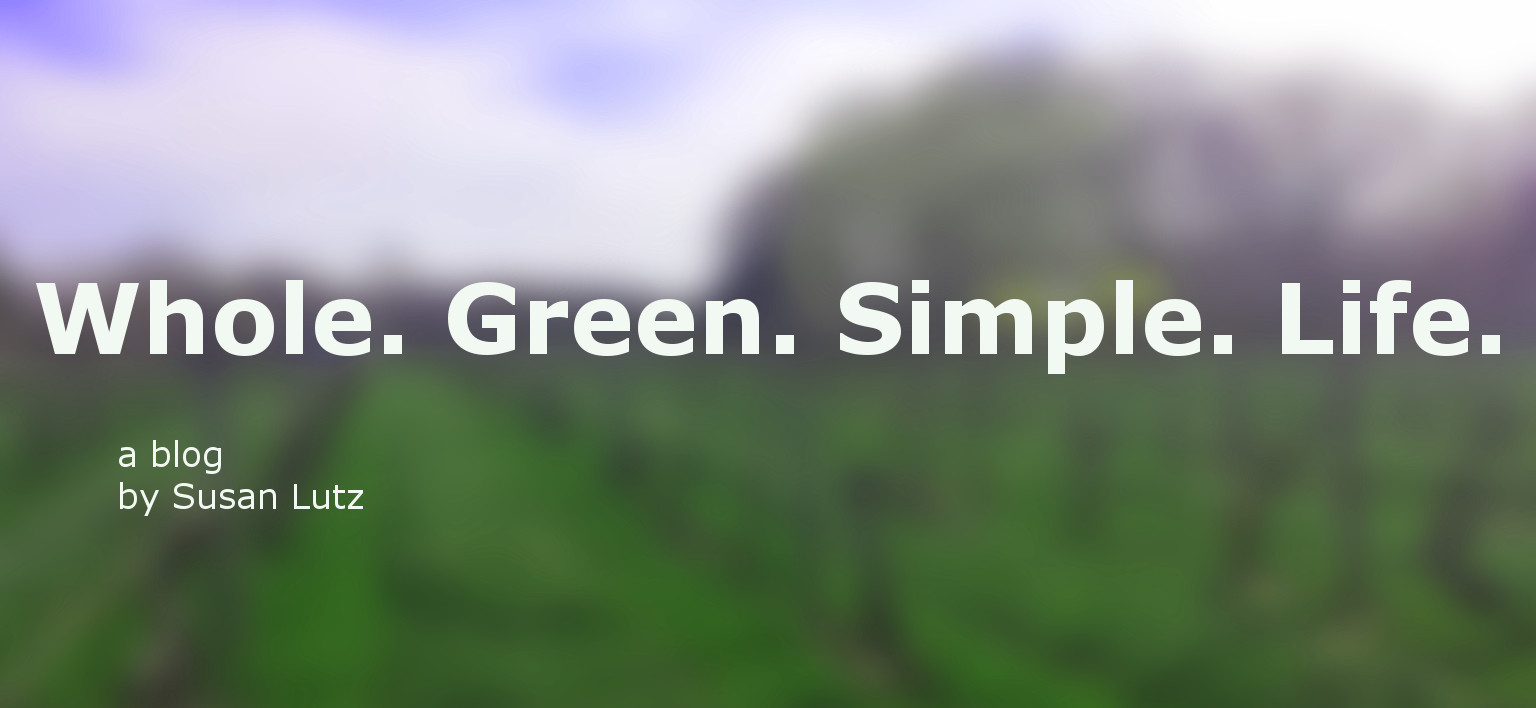
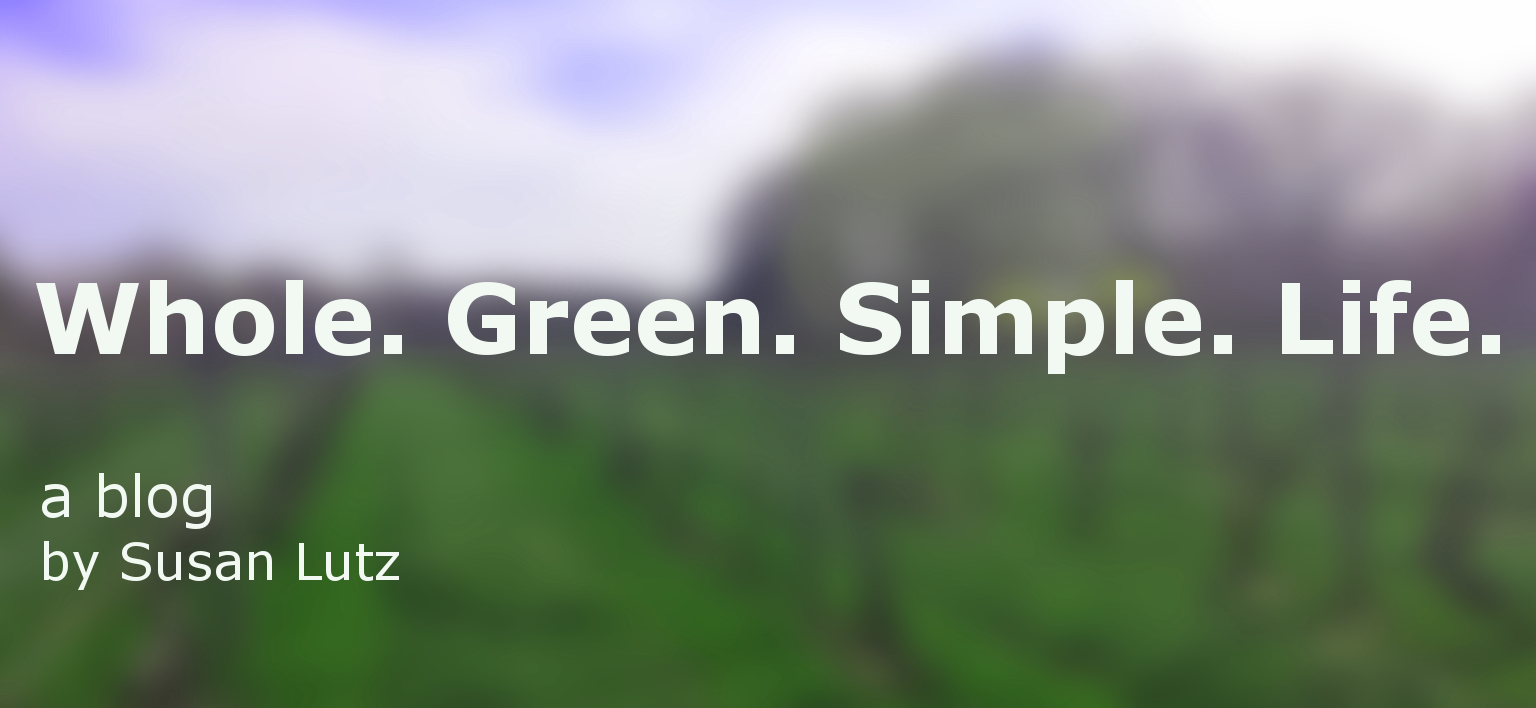
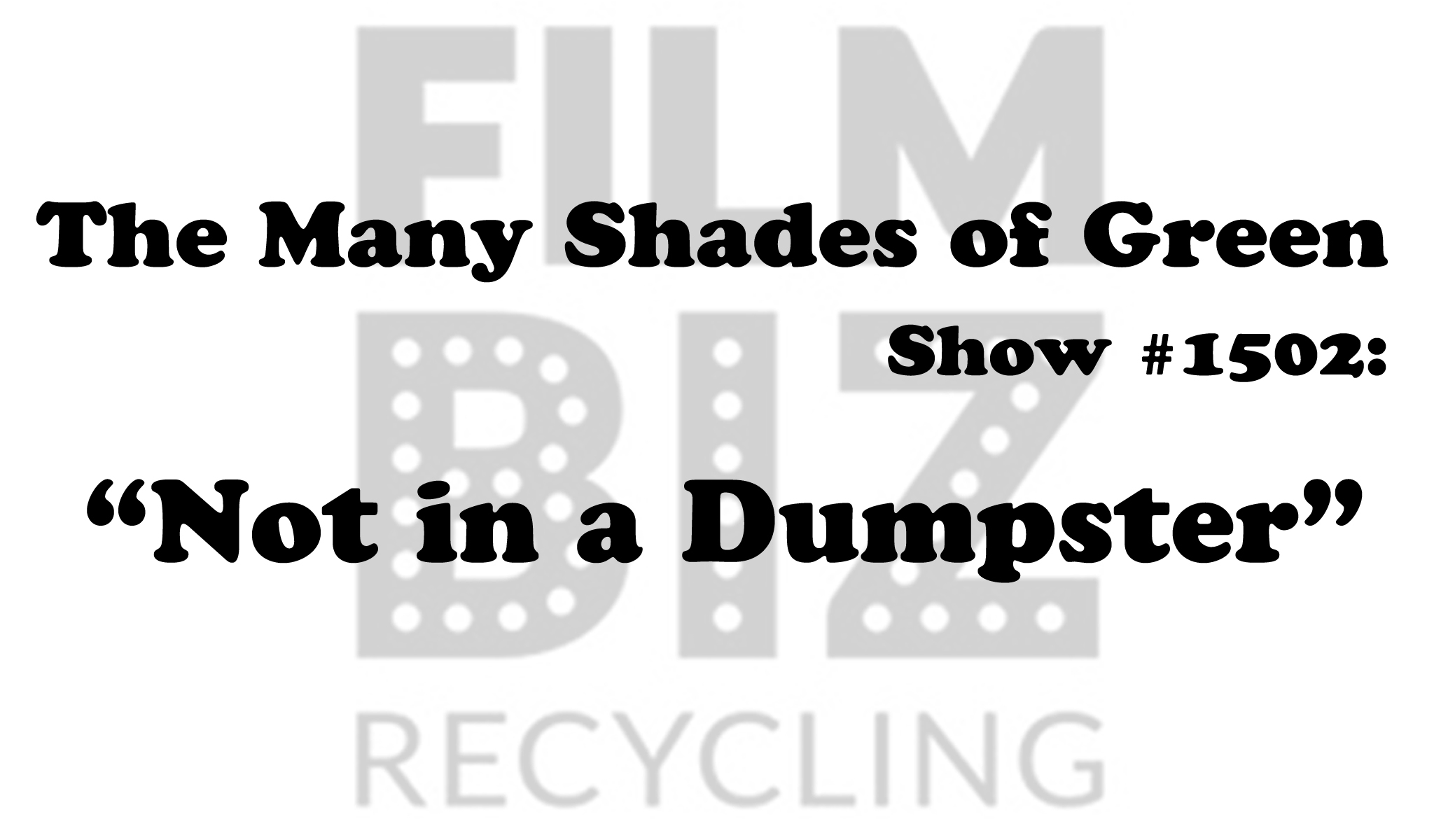

 By
By 